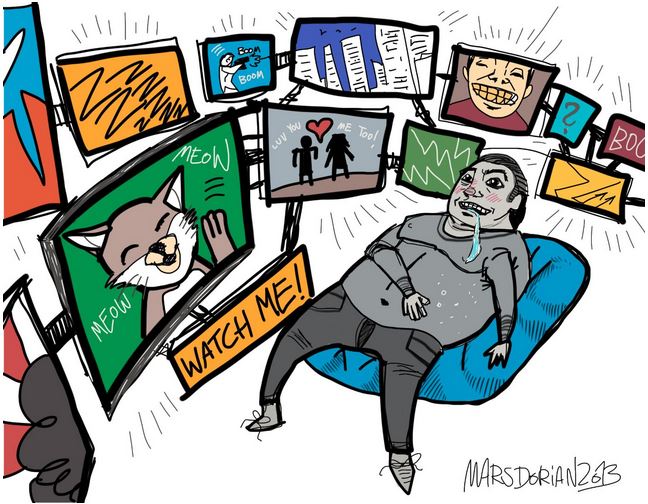Have you seen the movie Wall-E ?
 It’s a sci-fi animation movie by Pixar where humanity lives in a space station because the earth is trashed. Here’s the interesting part. Humans in the space station are beyond wealthy:
It’s a sci-fi animation movie by Pixar where humanity lives in a space station because the earth is trashed. Here’s the interesting part. Humans in the space station are beyond wealthy:
Because the robots do all the work, the humans can spend all day sitting in front of giant monitors, consuming media. They are depicted as overweight and dumb. They can neither run nor read.
You can laugh about this and say “what a funny story.”
But the sad truth is this is becoming a reality.
Let me make a bold prediction: The divide between those who survive and those who thrive in the future won’t be based on education or access to technology, but on a consumption-to-creation ratio.
Let me explain with a personal story.
Although my career is 100% online, I don’t own a smartphone (!).
That’s why I actually notice people when I pass through the streets of my hometown Berlin. And no matter where I look I see people glued to their mobile devices. Everyone. Everywhere. Kids half my size fumble with their phones, old people in parks e-read, hipsters check the newest apps.
Heck, when I was riding the U-Bahn (German metro) a few months ago, I even saw a bum begging for money with one hand, talking to someone over his iPhone with the other.
But when I ask some of them what they were doing, they all said the same things: Checking messages, updates, hearing music, watching video.
In short, they were stuck in the consumption mode, which I call the online ghetto. No physical poverty, but a mental one, because they only passively consume, like the degenerate humans in the “Wall-E” movie.
I thought, well, it’s just them. They’re average people, not like me and you, who do major work on the internet.
Wrong.
Years ago, at the beginning of my creative career, I worked hard to build my online presence. Or so I thought.
Because at the end of each month, I was wondering why I got so little done, despite sitting in front of my computer almost 24/7. I literally exercised nothing but my butt muscles. I wanted to bust that mystery, so I tracked my daily progress and got the answer. And it slapped my face left and right. Ouch.
This is what I really did most days:
1) Watching “inspirational videos” on TED to ignite the passion for my career.
2) Playing online browser games to “relax” from my online work.
3) Reading blog articles about online mavericks who “made” it.
Without realizing it, I had slipped into the online ghetto.
I was getting hooked on feel-good content. Waiting every day for the “dealer” to create more content that I could consume. I wasn’t creating much work … or making much money.
I came to the following conclusion :
The “poorer” the people, the more they consume online.
The “richer” the people, the more they create online.
All the people who lacked success were consuming the most, while those who succeeded were in creation mode.
I believe that if you want to be on the upper end of the online world, you must master your creation/consumption ratio.
Here are top five ways of escaping the online ghetto:
1. Do you have to be an early adopter?
Unless you work in the tech scene, the answer is no. Corporations have conditioned us to buy the next, shiny thing, but it’s almost never out of a “need” but a “want.” Besides, the first iterations almost always suck – do you still remember the first iPhone?
2. Focus on brain nutrition instead of junk.
Ze internet is a viral wonderland. But be picky about where you dabble.
Watching awkward cats fart or jump into milk cartoons vs. reading educational blogs that help you advance your (online) career *cough*read {grow}*cough*.
Brain junk satisfies you in the short-term, but lacks long-term value. It’s a quickie.
The majority of what I apply in my biz today comes from valuable content that others created.
3. Choose creation apps over consumption apps.
This one is quite tricky, because most apps are designed to turn you into pseudo-creators.
Foursquare, Goodreads, Path etc. all make you “do” stuff, but it’s to grow their database, not necessarily to enhance your online presence or career. To be a creator, you must focus the majority of time on using creation based apps.
The apps I now use most often are creation-based:
Evernote for research, Sketchbook Pro for drawing, Scrivener for writing.
4. Limit your online access.
This one is challenging, and honestly, it doesn’t work for me. But a lot of my online friends do it.
You can download apps like “Selfcontrol” or “Freedom” that either block specific sites or your whole access to the internet for a set period. Cutting out any distractions. This helps you focus on one thing, and one thing only — creating stuff.
Going cold turkey is tough love, but maybe the patient needs it.
5. Ask yourself this question …
Whenever you’re stuck in an app, ask yourself this question :
Is this helping me create better work?
I modify this question in many ways:
Will this app / tweet / share / “Facebook like” help me create better work?
99% of the time, it won’t. It’s a time wasting gimmick that puts me one step closer to the online ghetto.
Conclusion
I don’t want you to end up in the online ghetto. Yeah, I know fat cats who fart are funny.
I know people crashing into things is pure schadenfreude. And watching celebrities screw up can be addicting. But the more you fall into the web junk food consumption mood, the less you’re going to thrive.
What are you going to do today to avoid the online ghetto?
 Mars Dorian describes himself as a creative marketeer with a moon-melting passion for human potential and technology. You can follow his adventures at www.marsdorian.com/
Mars Dorian describes himself as a creative marketeer with a moon-melting passion for human potential and technology. You can follow his adventures at www.marsdorian.com/
Original illustration by the author.



